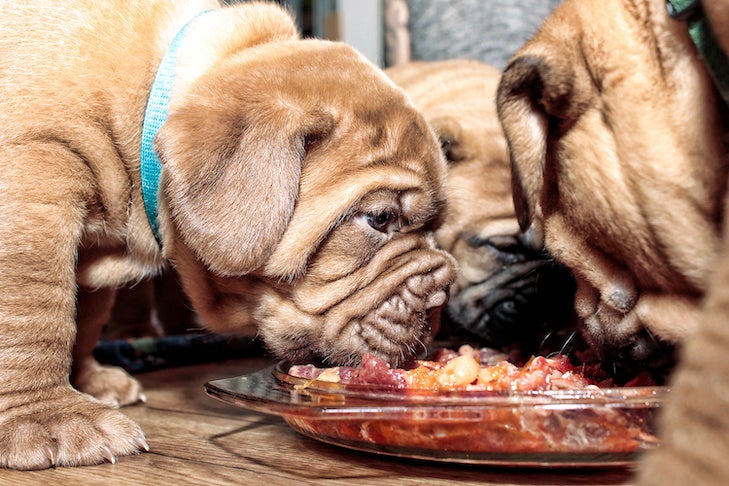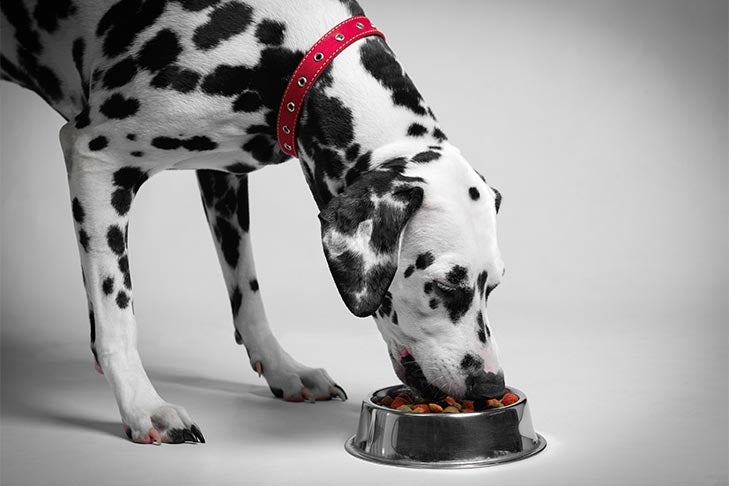
What’s the healthiest diet for a dog? It’s a meaty subject. Is it best to buy commercial food or feed homemade? Processed or raw? Kibble or canned? And one question many dog owners ask is “Do dogs need meat in their diets?”
Carnivore or Omnivore?
Gray wolves, Canis lupus, are definitely carnivores or meat-eaters and are capable of consuming up to 20 pounds of meat in one meal. According to the National Wildlife Federation, wolves prefer to eat large-hoofed mammals, such as deer, elk, bison, and moose. They also hunt smaller mammals, such as beavers, rodents, and hares.
When you look at a Pomeranian or a Poodle, it may be hard to imagine, but these breeds and all dogs, Canis familiaris, are direct descendants of the gray wolf. However, as dogs became domesticated, they developed different traits of digestion and metabolism that cause many scientists to classify them as omnivores.
Omnivores eat plant and animal matter. Humans are omnivores. Dogs produce amylase in much greater quantities than wolves, enabling them to digest foods other than meat. This enzyme allows dogs to digest a diet rich in starches – something wolves can’t do.
Some scientists disagree and identify dogs as carnivores. Why? Because dogs have long canine teeth designed to rip and tear meat. Dogs also have shorter gastrointestinal tracts compared to other omnivores and herbivores, as reported in Breeding Business. And while dogs do produce amylase, other omnivores produce the enzyme in their saliva, while dogs do not.
“Whether dogs are classified as carnivores or omnivores, I think most veterinarians would agree that over the centuries, the digestive system of dogs has adapted to allow them to eat and even to require a more complex diet than that of the wolf,” says Dr. Jerry Klein, AKC chief veterinary officer.

Balanced Diets for Dogs
A balanced diet that meets the nutritional requirements of a dog is a diet that includes meat and plant foods – provided the diet is made up of high-quality ingredients and includes the necessary proteins and fats.
The Merck Veterinary Manual says, “In developed countries, nutritional diseases are rarely seen in dogs and cats, especially when they are fed good quality, commercial, complete and balanced diets. Nutritional problems occur most commonly when dogs and cats are fed imbalanced homemade diets. Dog or cat foods or homemade diets derived from a single food item are inadequate. For example, feeding predominantly meat, or even an exclusive hamburger and rice diet, to dogs can induce calcium deficiency and secondary hyperparathyroidism.”
“Dogs require certain essential amino acids in their diets, and some proteins provide more value than others,” adds Dr. Klein. “Meat does provide all of those amino acids, but many plant proteins do not. However, a diet consisting solely of meat products will not meet all of your dog’s dietary requirements.”
Is Meat Required?
Dogs can thrive without meat, but only if they are fed a properly balanced vegetarian diet. As is true with people who prefer vegetarian diets, protein or vitamin deficiency can occur in dogs who eat strictly vegetarian diets if they are not properly supplemented.
Dr. Klein gives dog owners the following advice: “Feed your dog a food with high-quality ingredients. Your veterinarian can recommend a diet that best suits your dog’s size, age, breed, and activity level. If you choose to purchase a natural diet for your dog, make sure it’s free of animal and plant byproducts and chemicals.
“And if a homemade diet is your choice, work closely with your veterinarian or a veterinarian nutritionist to be sure that the recipe is comprehensive and includes all of the nutrients your dog requires to stay healthy and active.”
At Wild Earth, we believe that modern dogs have evolved with us, and just like us, a dog’s nutrition should also evolve to meet their changing needs in our shared world.
Wild Earth is nutrition for the evolved dog. High-quality and delicious food and nutritional products that deliver uncompromising dog wellness benefits—they just happen to be plant-based and are always cruelty-free.

